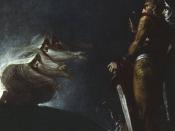Have you ever wanted something so bad, that you would do anything to get it? Would you go to death defying heights? In the play Macbeth, William Shakespeare introduces to his audience many such characters. It is clear that the following specific characters: King Duncan, Thane of Cawdor, Banquo, Lady Macbeth, and Macbeth, were the cause of their own downfall.
It is surprising to think that the almighty King of Scotland himself could create turmoil within his kingdom. This turmoil was caused by his gullibility to trust people. King Duncan's flaw allowed his noblemen to easily betray him. Duncan found loyalty in all the wrong people and even proclaimed deceitful Macbeth his "valiant cousin and worthy gentlemen." (Act 1, sc.2, Ln. 26) The Thane of Cawdor and Macbeth are just two examples of those traitors that King Duncan highly trusted. Overall, I think Duncan didn't deserve his fate.
For being a trustworthy King, he should have received respect than betrayal.
The Thane of Cawdor started Scotland's misfortune. "Norway himself, with terrible numbers, assisted by that most disloyal traitor the Thane of Cawdor, began a dismal conflict." (Act 1, sc. 2, Ln. 58-61) I believe that he was too cowardly to stay on Scotland's side in believing they would lose, so instead he sided with Norway's King and was sadly defeated. Cawdor's treachery pronounced his death. His punishment fit the crime, as death was a consequence of treachery and traitors weren't looked lightly upon.
Banquo, Macbeth's right-hand man, and a General of the Scottish army, was also victim to his own downfall. It started when three witches told of Macbeth and Banquo's future. Macbeth was told he would be many great things and Banquo was told he would be: "Lesser than Macbeth, and greater. Not so happy,



Macbeth
Thanks for an interesting essay on Shakespeare's well known play of greed and ambition. Many will agree that Macbeth and his wife caused their own downfall but your contention that the same is true of all of the characters you mention is somewhat more controversial. Still, you've provided support for your position and your report is valuable and enlightening. I liked the closing quote with which you effectively ended your paper. Fine effort!
5 out of 5 people found this comment useful.